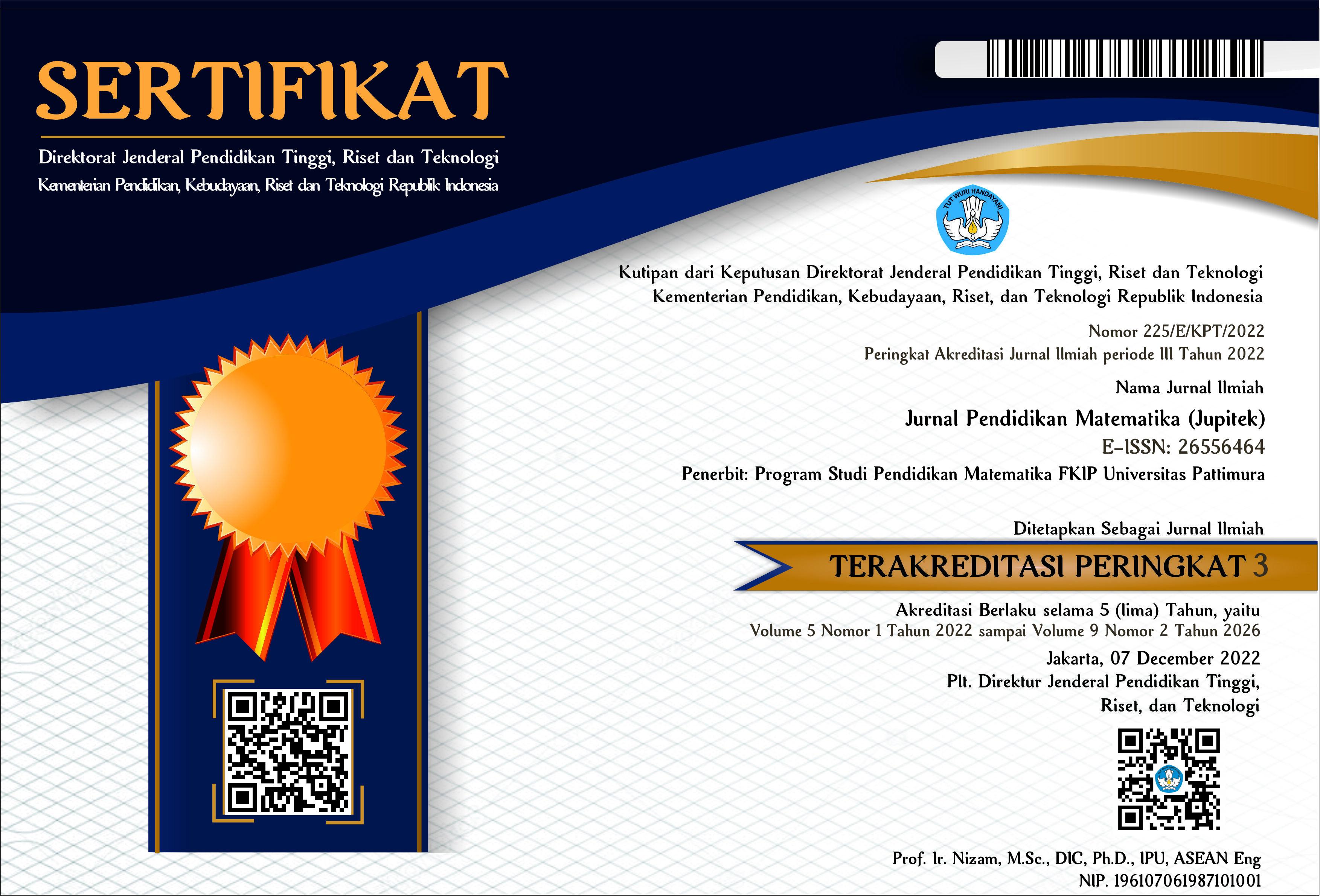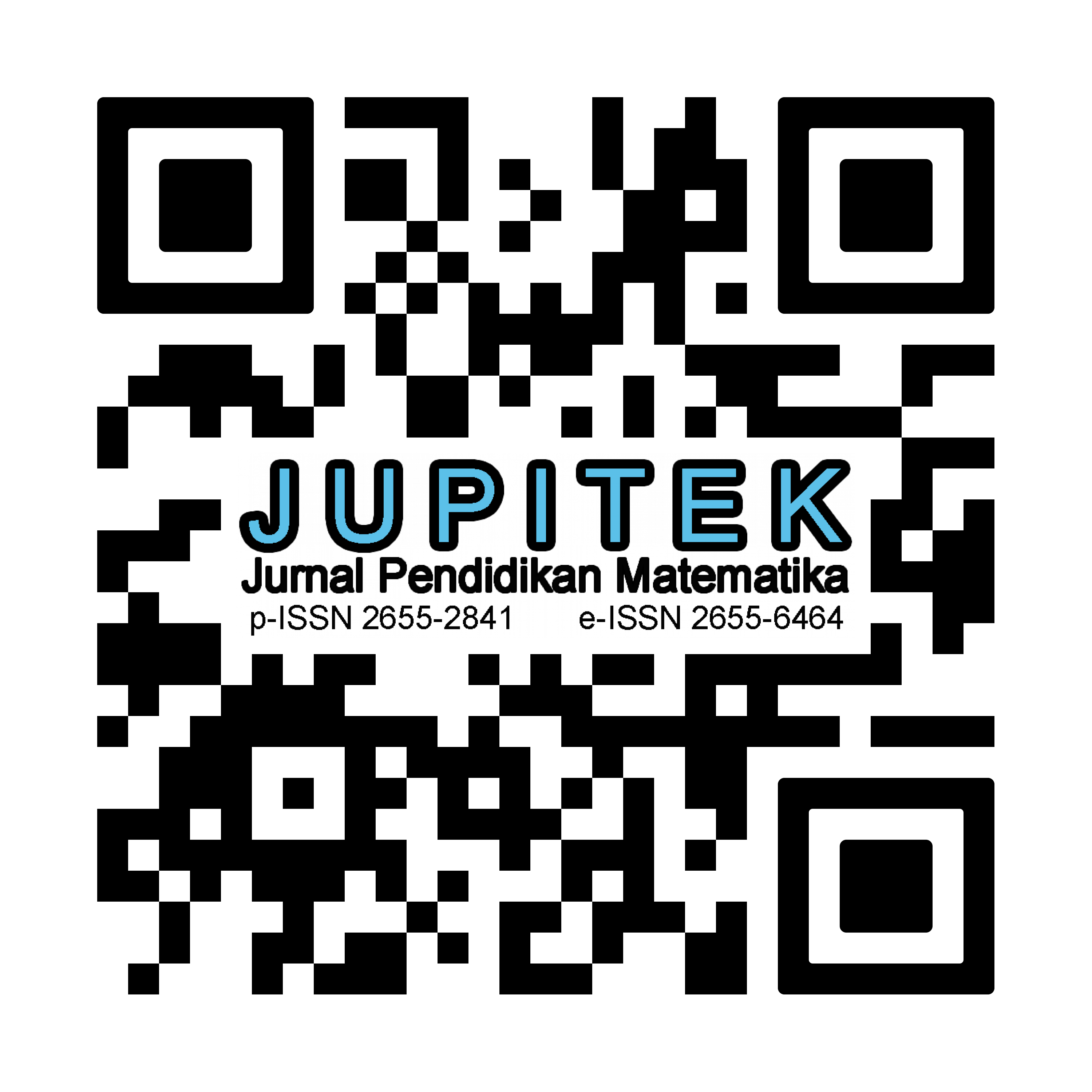PERBEDAAN HASIL BELAJAR SISWA YANG DIAJARKAN DENGAN MODEL PEMBELAJARAN KOOPERATIF TIPE THINK PAIR SHARE DAN MODEL PEMBELAJARAN KONVENSIONAL
Abstract
This research is motivated by student mathematics learning outcomes on the material two-dimentional figure still low. The learning process is still teacher-centered and there is a lack of good cooperation between students in discussions when the learning process takes place. This research is an experimental study that aims to determine whether there are differences in student learning outcomes taught by cooperative models Think Pair share and learning models The conventional research design used is Nonrandomized Control Group Posttest Design. The population in this study were all eighth grade students of Ambon-Wathan High School with 100 students and the sample in this study was 40 students, selected using purposive sampling. The instrument used in this study was in the form of test questions which consisted of question details for the final test. The analysis used is statistical analysis, which is t-test. Calculation results obtained, namely the value of Sig. (2-tailed) < α or 0.026 <0.05 which causes H0 to be rejected and H1 to be accepted. Based on the accepted hypothesis, the results of the study showed that there were differences in the learning outcomes of the experimental class and control class students who were taught with the Cooperative learning model of the Think Pair share type and the conventional learning model on the Material of Blocks and Beams
Downloads
References
Aqib, Z. (2013). Model-Model, Media Dan Strategi Pembelajaran Kontekstual (Inovatif). Bandung: Yrama Widya.
Joseph, E. (2012). Meningkatkan Hasil Belajar Pengukuran Dengan Menggunakan Pendekatan RME (Realistic Mathematic Education) Pada Siswa Kelas II SD Negeri 2 Galala.Ambon: FKIP Unpatti.
Kurniasih, I & Sani, B. (2016). Ragam Pengembangan Model Pembelajaran untuk Peningkatan Profesionalisme Guru. Jakarta: Kata Pena
Mutia. (2017). Analisis kesulitan siswa SMP dalam pemahaman konsep kubus balok dan alternatif pemecahannya. (Online). Diakses di https://jurnalbeta.ac.id/index.php/betaJTM/article/download/107/89/
Ratumanan. (2015). Inovasi Pembelajaran. Yogyakarta: Penerbit Ombak.
Trianto. (2009). Mendesaian Model Pembelajaran Inovatif-Progresif. Jakarta Kencana Prenada Group.
Sanjaya, W. (2017). Strategi Pembelajaran Berorientasi Standar Proses Pendidikan. Jakarta: Prenadamedia Group.
Shoimin, A. (2016). 68 Model Pembelajaran Inovatif dalam Kurikulum 2013. Yogyakarta: Arruzz Media.
Sugiyono. (2015). Metode Penelitian Kuantitatif, Kualitatif, dan R & D. Bandung: Alfabeta.
Sukardi. (2011). Metodologi Penelitian Pendidikan. Jakarta: Bumi aksara.
Sulistyaningsih, E. (2016). Analisis kemampuan pemecahan masalah matematika geometri PISA pada siswa kelas VIII semester genap SMP Negeri 1Mojosongo Tahun 2015/2016. (Online). Diakses di http://eprints.ums.ac.id/44952/
Yuliastutik, A. (2010).Penerapan Model Pembelajaran Problem Based Learning Dengan Media Video Campact Disk (Vcd) Dalam Upaya MeningkatkanMotivasiBelajar Dan Kemampuan Berpikir Kritis Mahasiswa. (http://core.ac.uk/download/files/478/16507757.pdf).Diakses pada 2 Januari 2018
Copyright (c) 2020 Nilam Wally, Juliana Selvina Molle, Christina Martha Laamena

This work is licensed under a Creative Commons Attribution-NonCommercial-ShareAlike 4.0 International License.
License and Copyright Agreement
By submitting a manuscript to Jurnal Pendidikan Matematika (JUPITEK), the author(s) certify and agree to the following terms:
- Originality and Authority: The submitting author is authorized by all co-authors to enter into this agreement. The manuscript describes original work that has not been published previously in a peer-reviewed journal, nor is it under consideration for publication elsewhere.
- Approval: Its publication has been approved by all author(s) and by the responsible authorities of the institutions where the work was carried out.
- Rights: The authors secure the right to reproduce any material that has already been published or copyrighted elsewhere.
- Licensing and Copyright: Authors retain the copyright to their work.
- License Grant: The authors grant Jurnal Pendidikan Matematika (JUPITEK) the right of first publication, with the work simultaneously licensed under the Creative Commons Attribution-NonCommercial-ShareAlike 4.0 International (CC BY-NC-SA 4.0).
- Self-Archiving: Authors are permitted and encouraged to deposit the published version of their article in institutional repositories, on their personal websites, and other academic platforms, with proper acknowledgment of its initial publication in Jurnal Pendidikan Matematika (JUPITEK).






.png)


